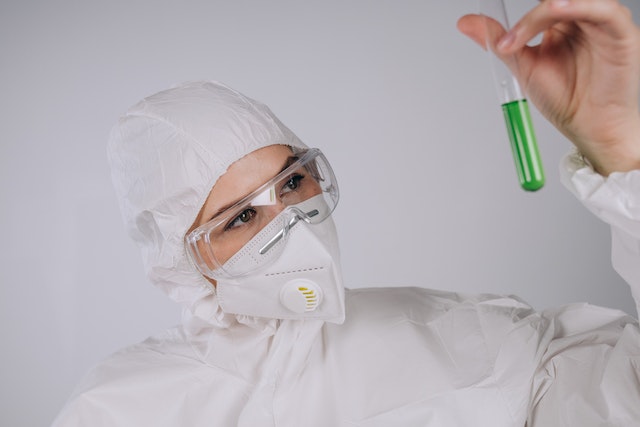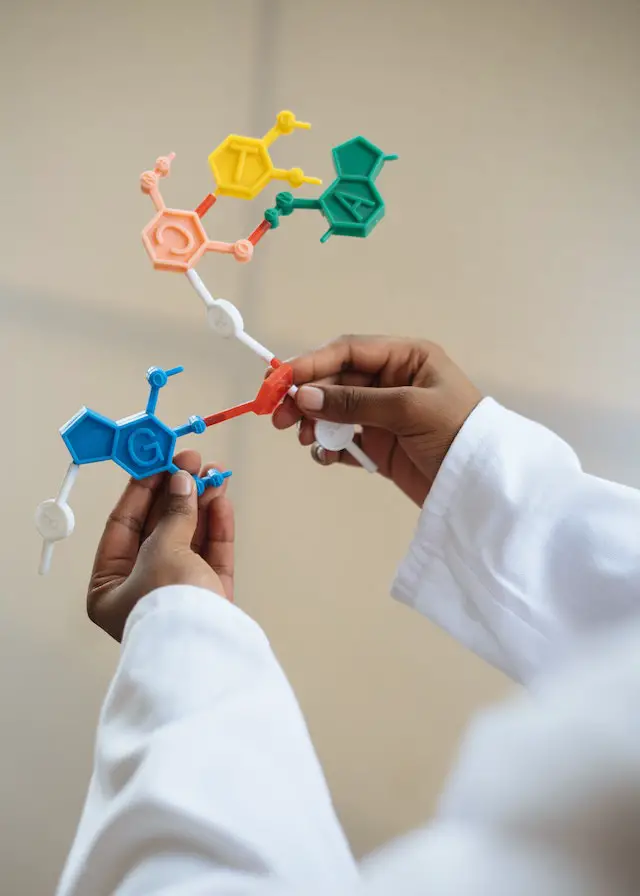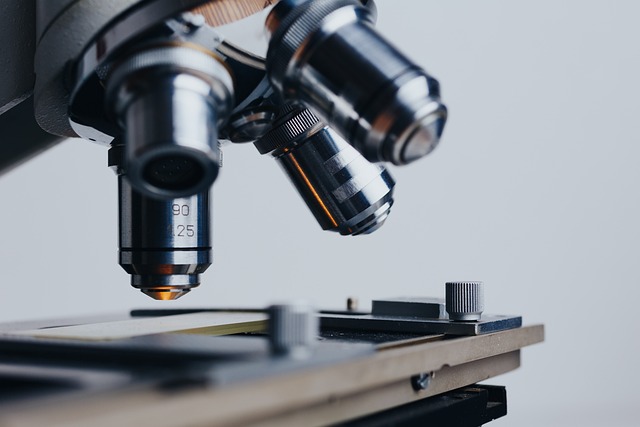To sum up, the main distinction between a biochemist and biophysicist is their focus. A biochemist examines organic molecules such as proteins, lipids, and DNA to understand how they act and interact while a biophysicist focuses on physical processes that occur within cells and in organisms.
What is biochemistry?
(Photo by Mikhail Nilov at Pexles.com)

Biochemistry is the study of chemical processes in living organisms. It covers a wide range of topics from DNA and RNA to proteins and cell membranes. Biochemists use a variety of techniques to study the structure and function of biomolecules.
What is biophysics?
(Photo by RF._.studio at pexles.com)

Biophysics is the study of biological systems using physical principles. It is a hybrid field that combines biology and physics. Biophysicists use physics to understand how biological systems work, on both a macroscopic and microscopic level.
On a macroscopic level, biophysicists study how large-scale biological systems work. This could include studying how muscles produce force, or how nerves transmit signals. On a microscopic level, biophysicists use principles of physics to understand how cells and molecules function. This could include studying the structure of DNA or the way proteins are built.
Biophysics is a relatively new field, and it is constantly evolving as we learn more about the complex systems that make up our bodies.
What are the differences between biochemists and biophysicists?
The main difference between biochemists and biophysicists is the focus of their work. Biochemists tend to focus on the chemical processes that occur in living things, while biophysicists tend to focus on the physical processes that occur in living things.
Biochemists usually have a background in chemistry, and they use this knowledge to study how chemicals interact with each other in living organisms. They might study how enzymes work, how cells communicate with each other, or how drugs affect the body. Biophysicists usually have a background in physics, and they use this knowledge to study how living things work at a physical level. They might study how muscles produce force, how nerves conduct signals, or how DNA is organized inside cells.
Both biochemists and biophysicists use math and computer modeling to help them understand the complex systems they are studying. And both fields overlap with other sciences like biology, medicine, and engineering. But overall, biochemists tend to focus on chemical processes while biophysicists tend to focus on physical processes.
Which is best biophysics or biochemistry?
There is no easy answer to the question of whether biophysics or biochemistry is best. Both disciplines have a lot to offer students interested in the life sciences. Biophysics provides a more holistic approach to studying living systems, while biochemistry focuses on the chemical processes that occur within cells. Each path has its own advantages and disadvantages.
Biophysics is ideal for students who want to understand living systems at a fundamental level. The mathematical and physical concepts covered in a biophysics program can be applied to many different areas of biology. Biophysicists often work on interdisciplinary teams, which gives them the opportunity to learn about other fields such as medicine, ecology, and engineering.
However, biophysics programs are often more theoretical than practical. Students may have trouble finding jobs after graduation if they don’t have experience working in a laboratory. Biochemists, on the other hand, are in high demand due to the growing field of molecular biology. They usually work in research laboratories and have the opportunity to conduct cutting-edge experiments.
So, which is best? It depends on your interests and career goals. If you want to pursue a career in research, biochemistry may be the better option. If you’re interested in a more theoretical approach to biology, then biophysics might be right for you.
How hard is it to become a biophysicist or biochemist?
There are many factors to consider when thinking about how hard it is to become a biophysicist or biochemist. Firstly, what level of education do you have? Secondly, what experience do you have in the field? Thirdly, what are your career goals? Fourthly, where do you want to work?
If you have a bachelor’s degree in biochemistry or physics, you may be able to find entry-level work as a research assistant. However, most jobs in this field require at least a master’s degree. To become a research scientist or professor, you will need to complete a PhD. The process of completing a PhD can take up to eight years.
Experience is also important for these roles. Many employers prefer candidates who have worked as an intern or in another entry-level role in the field. Candidates with more experience will be better equipped to handle the demands of the job and be more likely to advance in their career.
Finally, your career goals will also impact how hard it is to become a biophysicist or biochemist. If you are looking for a role that requires less education and experience, such as a research assistant, it may be easier to find a position. However, if you are looking for a more senior role, such as research scientist or professor, it will be harder to find a position without the appropriate education and experience.
Frequently asked questions about biochemists and biophysicists
Is biochemist a doctor?
The short answer is no, biochemists are not doctors. However, they may hold a Ph.D. in Biochemistry, which is the study of the chemical processes in living organisms. A biophysicist studies the physical properties of biological systems.
Do biophysicists make good money?
Yes, biophysicists do make good money. In fact, according to the Bureau of Labor Statistics, the median annual salary for a biophysicist is $82,950. That means that half of all biophysicists earn more than that amount and half earn less. The top 10% of biophysicists earn more than $118,430, while the bottom 10% earn less than $54,170.
What is the highest paid job in biochemistry?
The highest paid job in biochemistry is that of a research scientist. Research scientists are typically employed by pharmaceutical companies or biotech firms, and their salary depends largely on the success of their research. In some cases, research scientists may earn bonuses or stock options based on the commercial success of their discoveries.
Can a biochemist work in a hospital?
Yes, a biochemist can work in a hospital. However, they would likely be working in the research and development department rather than directly with patients. Biochemists in hospitals may develop new medications or treatments, test blood or tissue samples for disease markers, or study how the body responds to illness and injury.
What are the educational requirements for becoming a biochemist or biophysicist?
To become a biochemist or biophysicist, you will need to complete a bachelor’s degree in biology, chemistry, physics, or another related field. Many employers also require a master’s degree or doctorate.
Are there any professional organizations for biochemists and biophysicists?
There are a few professional organizations for biochemists and biophysicists, such as the American Society for Biochemistry and Molecular Biology (ASBMB) and the Biophysical Society. These organizations offer networking opportunities, resources, and programming to support the advancement of these disciplines.
Featured Image By – Image by Konstantin Kolosov from Pixabay









